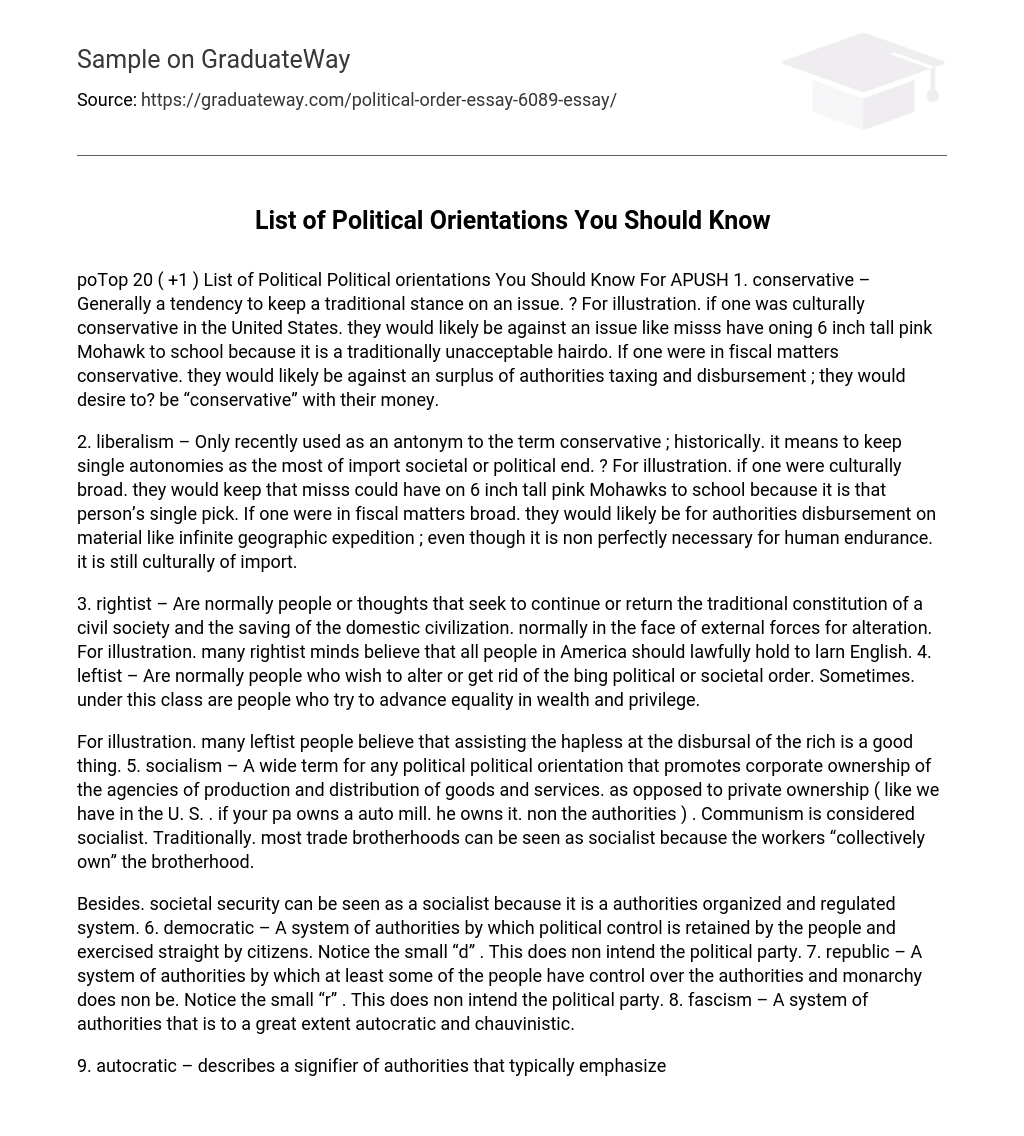- Conservative – Generally a tendency to keep a traditional stance on an issue. For illustration. if one was culturally conservative in the United States. they would likely be against an issue like misss have oning 6 inch tall pink Mohawk to school because it is a traditionally unacceptable hairdo. If one were in fiscal matters conservative they would likely be against an surplus of authorities taxing and disbursement ; they would desire to? be “conservative” with their money.
- Liberalism – Only recently used as an antonym to the term conservative ; historically. it means to keep single autonomies as the most of import societal or political end. For illustration. if one were culturally broad. they would keep that misss could have on 6 inch tall pink Mohawks to school because it is that person’s single pick. If one were in fiscal matters broad. they would likely be for authorities disbursement on material like infinite geographic expedition ; even though it is non perfectly necessary for human endurance. it is still culturally of import.
- Rightist – Are normally people or thoughts that seek to continue or return the traditional constitution of a civil society and the saving of the domestic civilization. normally in the face of external forces for alteration. For illustration. many rightist minds believe that all people in America should lawfully hold to larn English.
- leftist – Are normally people who wish to alter or get rid of the bing political or societal order. Sometimes. under this class are people who try to advance equality in wealth and privilege. For illustration. many leftist people believe that assisting the hapless at the disbursal of the rich is a good thing.
- socialism – A wide term for any political political orientation that promotes corporate ownership of the agencies of production and distribution of goods and services. as opposed to private ownership ( like we have in the U. S. . if your pa owns a auto mill. he owns it. non the authorities ) . Communism is considered socialist. Traditionally. most trade brotherhoods can be seen as socialist because the workers “collectively own” the brotherhood. Besides. societal security can be seen as a socialist because it is a authorities organized and regulated system.
- democratic – A system of authorities by which political control is retained by the people and exercised straight by citizens. Notice the small “d” . This does non intend the political party.
- republic – A system of authorities by which at least some of the people have control over the authorities and monarchy does non be. Notice the small “r” . This does non intend the political party.
- fascism – A system of authorities that is to a great extent autocratic and chauvinistic.
- radicalism – Usually denotes a drastic displacement from the traditional norm. normally to an extreme.
- libertarianism – Normally a political doctrine which prioritize single autonomy and normally seeks to minimise the province.
- communism – is a socioeconomic construction that promotes the constitution of an equal. classless based on common ownership of the agencies of production and belongings in general.
- populism – is a political political orientation which promotes “the common people” above or versus “the privileged” .
- progressivism – Normally seen as a political response to the Industrial Revolution. socialism. and anarchism ; it is a political political orientation that strives towards societal justness. publicity of democracy. and authorities efficiency. See Progressive Party.
- Marxism – A specific spirit of communism derived from the Hagiographas of Karl Marx. see communism.
- federalism ( Hamiltonianism ) – Alexander Hamilton’s subdivision of political idea that promotes a strong cardinal authorities composed of weaker provinces. This peculiar spirit besides includes really strong governmental intercession in economic issues.
- Jeffersonian Republicanism – In contrast to the above. a school of idea promoted by Thomas Jefferson that promotes provinces and single rights over a strong cardinal authorities. This spirit normally necessitates a virtuous public.
- Jacksonian Democracy – Normally seen as a mixture of the two above. promoted by Andrew Jackson. this system sees an addition of political engagement by the “common man” and an addition of the powers of a strong federal authorities.
- localism – a political or economic doctrine that prioritizes local demands over most else. Example. a metropolis go throughing a jurisprudence that the lone tomatoes that can be sold must be grown from a local farm is considered localism.
- anarchism – the publicity of the abolishment of all signifiers of authorities.
List of Political Orientations You Should Know
Cite this page
List of Political Orientations You Should Know. (2017, Sep 18). Retrieved from
https://graduateway.com/political-order-essay-6089-essay/





